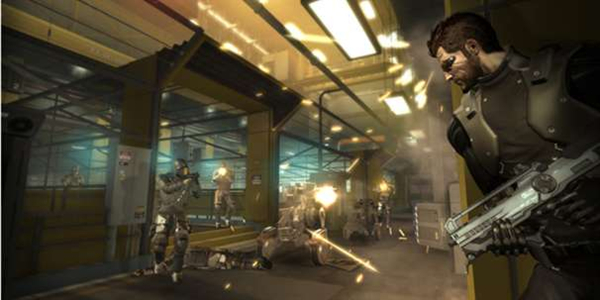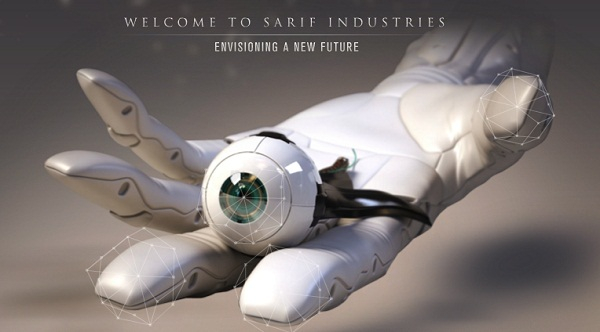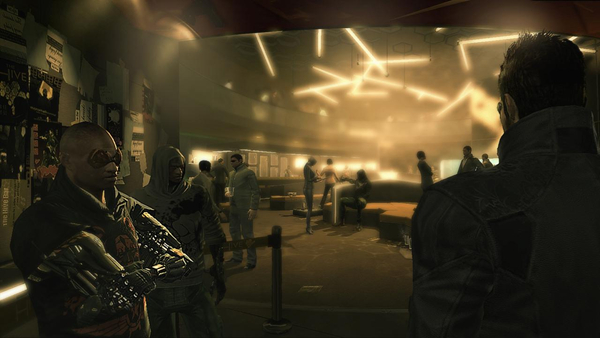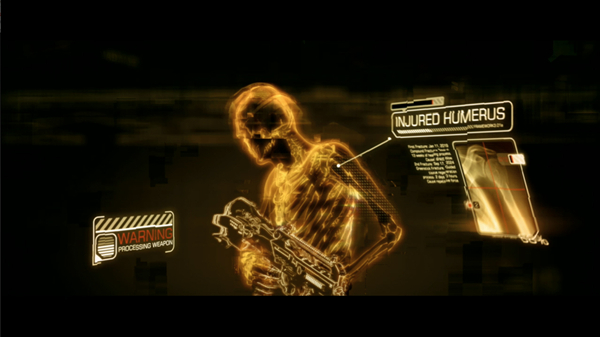Deus Ex: Human Revolution – Console Game Review
 Deus Ex: Human Revolution. Xbox 360 Review. Publisher: Square Enix. Developer: EIDOS.
Deus Ex: Human Revolution. Xbox 360 Review. Publisher: Square Enix. Developer: EIDOS.
Passed Inspection: Great graphics. Impressive freedom in gameplay.
Failed Basic: Slow load times experienced and with no online multiplayer capability; this title only has the campaign to keep the game in the disc tray.
In the months prior to release, Deus Ex: Human Revolution was already being hailed as a candidate for “Game Of The Year.” Game journalists flocked to conventions to grab a sneak peek at this much anticipated Sci-fi title. Even before its release Deus Ex: Human Revolution was being compared to Modern Warfare 3, the Battlefield series, and Arkham City: all respectable titles and all carrying serious gaming clout.
{default}So what is Deus Ex and why is it causing a stir in the gaming circles? Human Revolution is the third title in the Deus Ex franchise and it has a lot to live up to. The two previous titles were released on the PC only to smashing critical and popular success. In 2000 it was decorated with the title “Best PC Game of All time” and won a number of coveted “Game of the Year” Awards. Following up with Invisible War in 2003, this game split the gaming community with an exciting but blander offering. Many gamers were hoping for more political intrigue and conspiracy and were disappointed, and it lacked a number of gameplay elements the original offered. There is however, a constant trend in the Deus Ex series and that is choice – and this is something which Human Revolution certainly doesn’t shy away from.

A prequel to the original game, set in 2027, the game opens with the beginning of the Augmentation struggle for mankind. For a crash course in the world with which it is set, the world is divided into two camps: there are those who support human/mechanical blending (Transhumanism) and there are those who are against it, arguing that Humans shouldn’t sport more metal than your average set of dentures or medical prosthetics.
The player takes on the role of Adam Jensen, a security officer for Sarif Industries, a leading company in Human Augmentation. After an attack on his company building with him in it, Adam dons some serious hi-tech upgrades in order to save his life. The transition from protector of company assets to actually being a company asset is no easy aspect to swallow – and this plot is one of many that create a rich gaming experience. Mix in a love interest and a difficult boss and Deus Ex: Human Revolution becomes a truly immersive, multi-layered story. The story begins with Adam rebuilding his life after his unfortunate stay in a robotic hospital and the subsequent investigation into why the corporation was attacked. Additionally, Adam explores the reasons his love interest bit the dust.

So what can gamers expect from Deus Ex: Human Revolution and how does this compare with other games? Well, there are four different gameplay styles to tinker with, each of which has its own “tech tree” that can be developed: Combat, Stealth, Hacking, and Social.
With these skills, the player enjoys a variety of options to overcome a particular obstruction. Given a scenario, you are faced with three different options: you could employ your newly upgraded augmentation, turn invisible, and slip past this computer controlled rent-a-cop without being seen. Or, if you are feeling like a little payback is due after your recent stint on the operation table, you could sneak up behind the guard, activate your takedown move and perforate the unsuspecting individual with your newly installed hardware – a protruding blade from each elbow. Alternatively, if you wish to take your newly upgraded gun for a spin (much like your abilities, you can also find upgrades in the world which will allow you to improve handling, better reload or increased damage etc), unload a powerful clip for some overkill and FPS action.
Fancy none of these things? In certain instances you can have a chat. You never know when sweet talking the guy might allow you to pass or achieve an objective without having to scurry around or get your lovely new dry cleaned Matrix-style jacket dusty.

And this is the level of freedom which the player enjoys in Deus Ex throughout the game. Being a staple to the series, every obstruction will undoubtedly have various solutions; although admittedly some will be scripted and will end in someone’s demise. That said, where some games often impose guilt upon the player for choosing to complete an objective in a certain way which is desirable to the developer, Deus Ex: Human Revolution legitimately makes you feel as though there is no shame in using some smooth moves to get into a restricted area. This not only empowers the gamer but also opens up the title to two other important aspects: replayability and, more importantly, allowing the gamer to become immersed in the Deus Ex: Human Revolution universe. What if you don’t help someone in need at the beginning of the game? Would they have proven a useful ally in that all important end boss level? Will they end up being a needless thorn in your side and you could have done with removing them sooner? These are all legitimate questions and the player truly has the option of not only considering how far they want to go down the Human/Robotic rabbit hole, but must also balance those decisions against whether they wish to hold on to the remnants of their humanity by doing the "right thing."
So on to the gaming mechanics and visuals: taking the cover system from the Gears of War series and that of Rainbow 6 Vegas, Adam will take the third person view when crouching behind cover or blind firing around corners. Whilst this isn’t new to console games, the player gets a full sense of cover, rather than facing a wall in the first-person and not being able to see the environment around them. In addition, when activating a take down, Adam will enter a pre-set sequence in the third person, which will see you decapitating, slicing, or using your adversaries as a human pin cushion, all in glorious cinematics.
With these aspects clearly being evident in one or more titles on the proverbial shelf, what else does this game offer? The level of detail is astonishing and the team from Square Enix have surpassed themselves in backfilling every detail for the player to discover over the last four years of production.; From random emails which the player will have to hack or break into offices/flats to view – to overheard conversations. Some will hold useful information but all allow the player to relate to the setting and their surroundings. Another way in which the developers have tirelessly tried to engage the player is through the art of discussion: on meeting with one of your colleagues, you are offered a conversation wheel (a la Mass Effect) and you can either take the blunt conversation route or the empathetic and understanding one. For general conversations these have little impact other than to find out a bit more about the individual, but in some cases, can offer door codes, sensitive information, or locations for points of interest. An example: mixing in a little interactivity to the conversations, prior to the mission objective, I went on a self-guided tour of the office block – searching every broom cupboard to every toilet. With this in mind, when finishing my conversation and exiting the discussion, the colleague utters "those augmentations haven’t made you a woman, Adam. Stay out of the women’s toilets." This shows the attention to detail which Square Enix has invested in the game, in immersing the player’s interaction to the universe.
The real shining light of the game is technology. The variation of gameplay between one session and another is largely limitless and truly shows how impressive this title is: in completing objectives or picking up credits (the currency of the future), you can purchase Praxis Points (PP) – or Augmentation Upgrades. Some require an activation cost (2 PP) whilst some are ready for immediate upgrade. These vary between the Typhoon System (which fires mini ball-bearing like explosives in a 360 arc – for those all important last stand moments), improved Sensory Analysis (for reading a character’s body language for the optimum outcome of a conversation – similar to that of our previously reviewed title LA Noire to Strength Increase.
Whilst not all of these aspects will require upgrades, and some certainly are not required from a mission to mission basis, they offer variety in how the player will face an objective or achieve an outcome. Upgrade your vision to see through walls and you can successfully track adversaries on your radar or negotiate your environment to stay out of sight. Upgrade your muscles and you can remove obstacles or vending machines and reveal a previously blocked access or to climb to a previously unreachable location for a better vantage point. This transforms Deus Ex: Human Revolution into something far more than a standard shooter. The variety of augmentations and multiple solutions makes choosing what to upgrade a real struggle and forces the player to use some grey matter to negotiate their way through this near future dystopian society.

Finally, a word on appearances. With a hue of golden yellow and sporting Blade Runner inspired landscapes, the art and style of the surroundings will tempt the gamer to explore every ill-advised alleyway and gang-infested sewer. The massive maps make the title an impressive one in which to undertake sporadic bouts of corporate espionage. Whilst some aspects of the game have been poorly rendered (windows which appear to have “painted” corridors inside) or boxy, less trodden areas – these are rare and by any event, few and far between. With the style and the architecture in keeping with science fiction novels (sky trains and over accentuated leather jackets), the title really shows its worth in cut-scenes or when you are discussing segments of your mission with another character. Adam’s implants have an errie sheen and you can see them in the reflection of someone’s sunglasses when speaking with them.. With the storyline and the level of interactivity delivered in aces, the graphics adds that final polish to what is shaping up to be a breathtaking title.
In closing then, Deus Ex has lived up to its lofty expectations and has truly been carved out of a piece of genius; something which Square Enix is known to do on the odd occasion – and it is showing. With terms such as "Game of The Year Award" being used, it’s hard to discredit these views. Human Revolution leaves no stone uncovered when enticing and delving the player into its unique universe. With the level of freedom, socio-political themes, and offering the player multiple outcomes to their cavalier or well-planned actions, this game is a marvel to behold. With 25+ hours of game time and various side-quests to offer in expanding the gamer’s experience in the Deus Ex universe, this certainly offers value for money.
That said, the game does have some blemishes. Slow load times – between re-loading segments (you can manually save throughout your play through which is a god-send when playing out various outcomes during your time in the game) and loading levels, I found myself often waiting patiently for 30 or more agonizingly long seconds to get back into the fray. The other aspect which should also be noted is the absence of multiplayer. Both of these issues are overcome by the stellar storyline, and exemplary graphics. Console gamers who may never have experienced this depth of gaming before are about to be introduced to a game that will set the standard for immersiveness and gameplay.
Overall – a definite must play for all sci-fi and FPS fans!
ACG Rating: 91%

